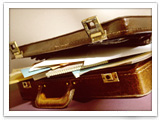 |
Khai McBride Certified Mortgage Planner Skyline Financial Corp. Phone: 800.399.6890 Fax: 800.399.6891 khai@mcbridegroup.com www.mcbridegroup.com |
 | ||
| ||||
April 2007

|
How Much Clutter Are You Carrying? By Jason W. Womack, M.Ed., M.A.
According to the laws of thermodynamics, the amount of disorder in an isolated system can only increase over time. In other words, disorganization is a natural phenomenon over which we have no real control. Whether it's a wallet or a purse, our minds or our desks, our systems of organization will eventually fail, leaving an accumulation of clutter in its wake – but none of it is our fault! Right? Wrong. Many of us use the "disorder is inevitable" excuse to never even attempt to organize ourselves. But clutter has actual negative effects on our physical and mental well-being. That's why it's worth investing less than half of an hour to try and regain some control over the clutter. The following are two specific, practical examples of how to lighten the load on your body and mind caused by clutter. By removing this baggage from your life, not only will you feel lighter and move quicker, you'll also think quickly and clearly, and make faster and smarter decisions. 1. Lighten the Physical Load Start with something small: a purse, wallet, or briefcase. Empty it out onto a table until it is completely bare. Now, one item at a time, review everything and only put back what actually belongs there. Then, put it off to the side. Examine the clutter that remains on the table. Are there loose coins, old mints, food wrappers, random receipts, or expired credit cards? Are there scraps of paper with information you might need, like a phone number or a note for a co-worker? Are you surprised by how much clutter you have, just in your wallet, briefcase, or purse? As basic as this exercise seems, people are often shocked, even embarrassed, by the excess weight they carry around every single day in this one item alone.
Beat procrastination and empty your "mind-clutter" with these simple tools:
These useless things not only add unnecessary physical weight to your life, they create unnecessary clutter in your mind as well. For example, whenever you reach into your bag and fail to find what you need, you end up creating undue stress and frustration. This also slows you down, creating further mistrust of your organizational system. Now, think about the other cluttered places (house, car, desk drawers, kitchen counter, office space, etc.) that you would be uncomfortable showing to clients, co-workers, or even close friends. Are the stacks of papers covering your desk, the drawers full of knickknacks, or your messy car full of empty water bottles intruding on your relationships with key people in your life? Just as the excess stuff was weighing on your bag, the clutter in these places are weighing on your mind throughout the day and night, stealing valuable space. Whatever these things are, consider processing them thoroughly, just like you did with your wallet, briefcase, or purse. Over the next week, select one area for this method of focusing. Keep what is current, necessary, and relevant. Get rid of anything that is old, expired, or distracting you. Imagine how good you would feel when your house, car, desk drawers, kitchen counter, office space – your whole world is this squeaky clean. 2. Lighten the Mental Load Next, consider all the unfinished projects you are currently managing or planning: a corporate program, a new community event, or that trip you're supposed to take with your family. Are you procrastinating on the planning or execution of these events? Would you like to get going on this sooner rather than later? If so, you are creating what's called open loops in your mind, mental clutter that is about as useful as the random scraps of paper that cluttered up your briefcase. To tackle these unclosed loops, start by picking one of your projects to plan. You will make progress that is more direct on any project as soon as you identify and focus on it. Even better, if you can write out a few sentences describing the completed project, you may discover that you are actually more motivated than you think. An additional benefit of going through this writing process is documenting the strengths and weaknesses of your project. Take the time (just a few minutes) to write everything you can imagine this projects needs, lacks, and provides. Make sure to include a specific project outcome, so that you know the final destination and what it will encompass. You should feel a little more in control and less dazed and confused. In addition, you should see the essence of what you have already decided and chart the course for the future. In most cases, people do not procrastinate because they don't know what to do. They procrastinate deciding what the doing will look like once they actually do get started. For many people, the value of putting plans on paper include:
One way to clear the clutter is to get these things out of your mind. You may not be able to spot valuable information and important connections if you continue "remembering" all of the details. Instead of clogging your mind, document the details on paper. If you suddenly think of new information or more details, simply add them to your document. You can use paper, Post It™ notes, software, a file – whatever. Just get it out of your head and onto the paper. By closing those open loops, you will open up valuable space for making connections you may not have had the bandwidth to establish before. What's more, you may even notice a new spring in your step, as if a weight had been lifted from your shoulders. These days, Jason W. Womack, M.Ed., M.A., only lifts excess weight at the gym. His briefcase is his traveling office, of which he gladly gives tours. As a California-based expert speaker and writer, he focuses on realizing potential, maximizing productivity, and achieving a balanced lifestyle. Please contact him at Jason@JasonWomack.com or (805) 798-1362. Read more about Jason at www.FitAndEffective.com. | ||||||||||||||||||||||||||||||
You are receiving a complimentary subscription to YOU Magazine as a result of your ongoing business relationship with Khai McBride. While beneficial to a wide audience, this information is also commercial in nature and it may contain advertising materials. INVITE A FRIEND to receive YOU Magazine. Please feel free to invite your friends and colleagues to subscribe. SUBSCRIBE to YOU Magazine. If you received this message from a friend, you can subscribe online. UNSUBSCRIBE: If you would like to stop receiving emails from Khai McBride, you can easily unsubscribe. Skyline Financial Corp. |
26840 Agoura Road Calabasas, CA 91301 Powered by Platinum Marketing © Copyright 2024. Vantage Production, LLC. | |||||||||


